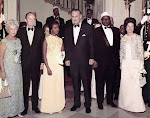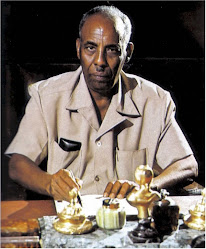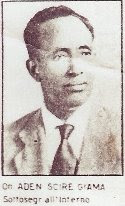
The 22-year-old from Minneapolis is in hiding, a community leader said, adding that the recruit for jihad had a change of heart???
A young Somali man from Minneapolis believed to have been recruited by a terrorist group to travel to his war-torn homeland has returned to Minnesota, a community leader said Saturday.
Omar Jamal, executive director of the Somali Justice Advocacy Center, said Saturday that the 22-year-old man was recruited for jihad before a change of heart led him to return in recent months. Jamal wouldn't confirm the man's identity, saying that he and his family fear for their safety and are in hiding. Others identified him only as Kamal.The disappearances of perhaps a dozen young men from the Twin Cities have traumatized and divided the local Somali community.Jamal also wouldn't say why the man went to Somalia or how he financed the trip, but said he apparently returned because "his expectation was not what he wanted when he went over there. ... I think he simply didn't like what he saw over there."Jamal said the man has met with FBI investigators but is not in jail.FBI special agent E.K. Wilson declined Saturday to comment about the development or the status of the travelers "because of the ongoing investigation," he said.Federal authorities have been investigating the possible connection between terrorist groups and the disappearances of seven to 20 young Somali men in the Twin Cities since last fall, when Shirwa Ahmed, a 27-year-old college student from Minneapolis, blew himself up in Somalia in an October attack that killed up to 30 people.Ahmed immigrated with his family to Minneapolis in the mid-1990s but returned to Somalia after he was recruited by a militant group, FBI Director Robert Mueller said last month. Mueller said that Ahmed had apparently been indoctrinated into extremist beliefs while living in Minneapolis. Members of the Somali community were called to testify before Congress on March 11. Others have been subpoenaed to testify before a grand jury in Minneapolis. Farhan (Omar) Hurre, director of the Abubakar As-Saddique mosque in south Minneapolis, said Saturday that he knows of at least 10 people within the Somali community who received subpoenas in the past two months."They turn to us for help because most of the people are not familiar on what to do with the subpoena," Hurre said. "They get a letter from an FBI agent saying 'You have to appear at such and such date.' These people are pretty well connected to the mosque, and they turn to us for help."'He's really afraid'Jamal said the man who returned to Minnesota had been recruited by a group called al-Shabab, an Al-Qaida off-shoot, and left Nov. 4 for Somalia, where he expected vocational training and study but encountered war and further indoctrination."The mobilization of the jihad and what have you is different when they really go over there," Jamal said.The man's family has since changed their address and telephone number. "He's really afraid at the moment," Jamal said. "I think you know by now the level of sensitivity and seriousness of this issue. ... The community is completely divided over this, and it's creating a serious pressure. Because of that, there's a collective fear and concern over this." Jamal said the man is not a terrorist."We believe that this guy and many others that have gone missing are victims of people who are led to be part of something that's bigger than them." Osman Ahmed, president of the Riverside Plaza Tenants Association, whose 17-year-old nephew, Burhan Hassan, also left home in November, said he has not personally encountered a missing man that has returned. But several close friends told Ahmed that a 22-year-old man named Kamal has returned, although the circumstances are not clear.Minneapolis connectionWhile FBI director Mueller never said where Shirwa Ahmed was influenced, much of the focus has been on Twin Cities mosques, and Abubakar specifically.In late November, an imam and youth director from Abubakar were prohibited from boarding a flight to Saudi Arabia. At that time, an attorney representing the mosque, the largest in the Twin Cities, said they were put on a federal ''no fly'' list because they and the mosque were connected by rumor to the missing men.Sources close to the federal investigation have said that Ahmed, along with some of the other missing men, including Burhan Hassan and Mustafa Ali, 17, of St. Paul, spent time at or had ties to Abubakar.Hurre, the mosque director, has said that he did not know Shirwa Ahmed, but that others at the mosque knew him and were aware that he had spent time there. "He used to worship here, come here, yes," Hurre said again Saturday.Nevertheless, he and other officials at Abubakar have repeatedly denied that the mosque had anything to do with the men's disappearance."We have nothing to do with these kids who left," he said in February. Hurre said again Saturday that mosque leaders have discussed the issue many times among themselves and are convinced that nobody on the staff taught or influenced the young men. "I'm so confident the mosque message that we are teaching here has nothing to do with that and that none of the administration has something to do with that or preaching that." Hurre said that mosque officials are still hoping to meet with the FBI to talk about the investigation and learn how they can help...Continue to next page
A young Somali man from Minneapolis believed to have been recruited by a terrorist group to travel to his war-torn homeland has returned to Minnesota, a community leader said Saturday.
Omar Jamal, executive director of the Somali Justice Advocacy Center, said Saturday that the 22-year-old man was recruited for jihad before a change of heart led him to return in recent months. Jamal wouldn't confirm the man's identity, saying that he and his family fear for their safety and are in hiding. Others identified him only as Kamal.The disappearances of perhaps a dozen young men from the Twin Cities have traumatized and divided the local Somali community.Jamal also wouldn't say why the man went to Somalia or how he financed the trip, but said he apparently returned because "his expectation was not what he wanted when he went over there. ... I think he simply didn't like what he saw over there."Jamal said the man has met with FBI investigators but is not in jail.FBI special agent E.K. Wilson declined Saturday to comment about the development or the status of the travelers "because of the ongoing investigation," he said.Federal authorities have been investigating the possible connection between terrorist groups and the disappearances of seven to 20 young Somali men in the Twin Cities since last fall, when Shirwa Ahmed, a 27-year-old college student from Minneapolis, blew himself up in Somalia in an October attack that killed up to 30 people.Ahmed immigrated with his family to Minneapolis in the mid-1990s but returned to Somalia after he was recruited by a militant group, FBI Director Robert Mueller said last month. Mueller said that Ahmed had apparently been indoctrinated into extremist beliefs while living in Minneapolis. Members of the Somali community were called to testify before Congress on March 11. Others have been subpoenaed to testify before a grand jury in Minneapolis. Farhan (Omar) Hurre, director of the Abubakar As-Saddique mosque in south Minneapolis, said Saturday that he knows of at least 10 people within the Somali community who received subpoenas in the past two months."They turn to us for help because most of the people are not familiar on what to do with the subpoena," Hurre said. "They get a letter from an FBI agent saying 'You have to appear at such and such date.' These people are pretty well connected to the mosque, and they turn to us for help."'He's really afraid'Jamal said the man who returned to Minnesota had been recruited by a group called al-Shabab, an Al-Qaida off-shoot, and left Nov. 4 for Somalia, where he expected vocational training and study but encountered war and further indoctrination."The mobilization of the jihad and what have you is different when they really go over there," Jamal said.The man's family has since changed their address and telephone number. "He's really afraid at the moment," Jamal said. "I think you know by now the level of sensitivity and seriousness of this issue. ... The community is completely divided over this, and it's creating a serious pressure. Because of that, there's a collective fear and concern over this." Jamal said the man is not a terrorist."We believe that this guy and many others that have gone missing are victims of people who are led to be part of something that's bigger than them." Osman Ahmed, president of the Riverside Plaza Tenants Association, whose 17-year-old nephew, Burhan Hassan, also left home in November, said he has not personally encountered a missing man that has returned. But several close friends told Ahmed that a 22-year-old man named Kamal has returned, although the circumstances are not clear.Minneapolis connectionWhile FBI director Mueller never said where Shirwa Ahmed was influenced, much of the focus has been on Twin Cities mosques, and Abubakar specifically.In late November, an imam and youth director from Abubakar were prohibited from boarding a flight to Saudi Arabia. At that time, an attorney representing the mosque, the largest in the Twin Cities, said they were put on a federal ''no fly'' list because they and the mosque were connected by rumor to the missing men.Sources close to the federal investigation have said that Ahmed, along with some of the other missing men, including Burhan Hassan and Mustafa Ali, 17, of St. Paul, spent time at or had ties to Abubakar.Hurre, the mosque director, has said that he did not know Shirwa Ahmed, but that others at the mosque knew him and were aware that he had spent time there. "He used to worship here, come here, yes," Hurre said again Saturday.Nevertheless, he and other officials at Abubakar have repeatedly denied that the mosque had anything to do with the men's disappearance."We have nothing to do with these kids who left," he said in February. Hurre said again Saturday that mosque leaders have discussed the issue many times among themselves and are convinced that nobody on the staff taught or influenced the young men. "I'm so confident the mosque message that we are teaching here has nothing to do with that and that none of the administration has something to do with that or preaching that." Hurre said that mosque officials are still hoping to meet with the FBI to talk about the investigation and learn how they can help...Continue to next page



.jpg)











No comments:
Post a Comment